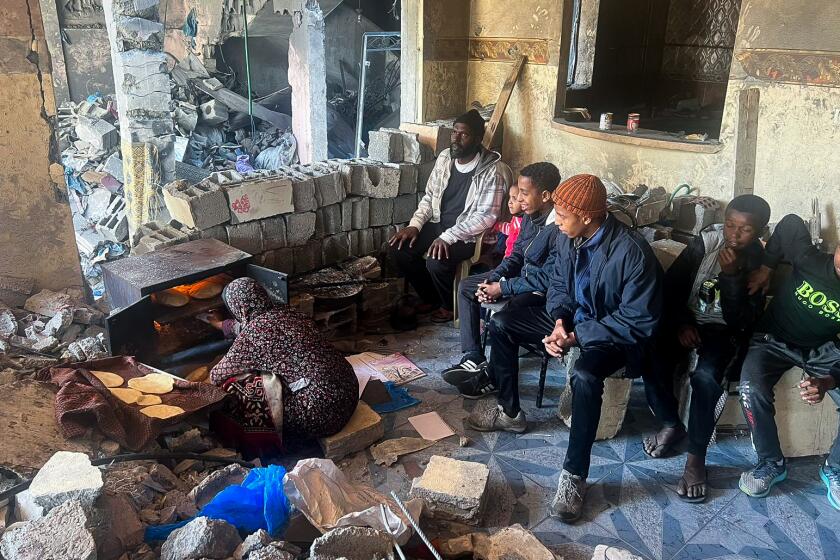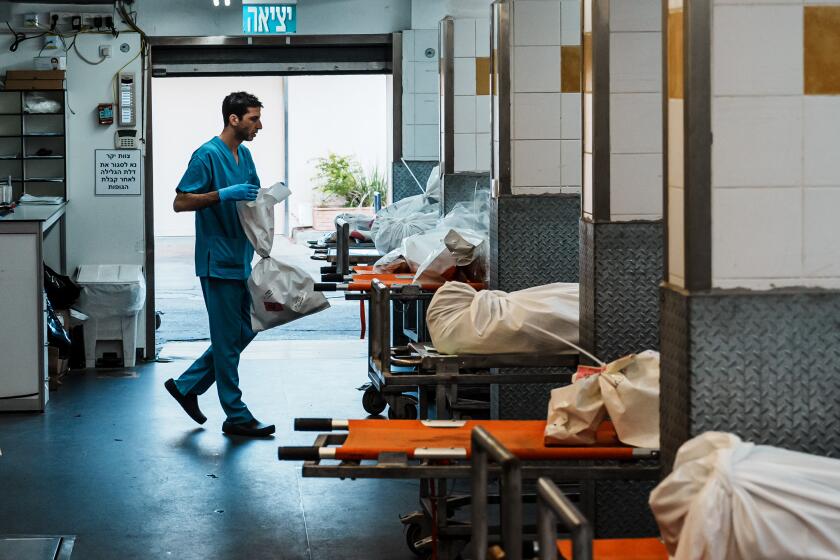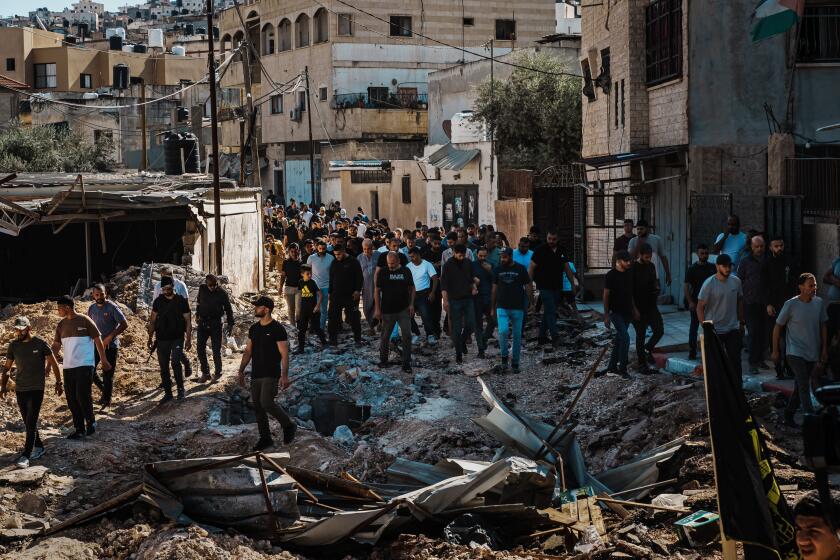Palestinian toll in Gaza passes 25,000 while Israel announces the death of another hostage

RAFAH, Gaza Strip — The Palestinian death toll from the war between Israel and Hamas has soared past 25,000, the Health Ministry in the Gaza Strip said Sunday, while Israel announced the death of another hostage and appeared far from achieving its goals of freeing more than 100 others and crushing the militant group.
The death, destruction and displacement from the war is without precedent in the decades-old Israeli-Palestinian conflict. The war has divided Israelis and threatens to ignite a wider war involving Iran-backed groups in Lebanon, Syria, Iraq and Yemen that support the Palestinians.
Furious with the Israeli government and demanding the release of remaining hostages, relatives and others set up a tent camp outside Israeli Prime Minister Benjamin Netanyahu’s residence in Jerusalem and vowed to stay until a deal is reached.
Netanyahu, in a defiant new statement, said he stressed in his conversation with President Biden on Friday that he rejects Hamas’ demands for a cease-fire, Israeli forces’ withdrawal and the release of Palestinians held by Israel in exchange for the remaining hostages. He said that agreeing means another devastating Hamas attack “would only be a matter of time.”
‘I just don’t know where we’ll go.’ It’s a question Palestinians ask over and over in Gaza as Israel ramps up bombardment after Hamas truce collapsed.
Netanyahu also has rejected U.S. and international calls for postwar plans that would include a path to Palestinian statehood. U.N. Secretary-General António Guterres called the refusal to accept a two-state solution “totally unacceptable.”
“The Middle East is a tinderbox. We must do all we can to prevent conflict igniting across the region,” Guterres added Sunday. “And that starts with an immediate humanitarian cease-fire to relieve the suffering in Gaza.”
In the latest of near-daily clashes between Hezbollah forces and Israeli troops along the Lebanese border, an Israeli airstrike on Sunday hit a car near a Lebanese army checkpoint in the southern town of Kafra, killing at least one person and injuring several others, Lebanese state media reported. Their identities were not immediately clear. Israel’s military said its aircraft and tanks struck a number of Hezbollah targets and that an antitank missile launched from Lebanon hit a house in Avivim in northern Israel. No injuries were reported.
Gaza death toll climbs
The latest war began with Hamas’ attack in southern Israel on Oct. 7. Palestinian militants killed some 1,200 people, mostly civilians, and took about 250 hostages back to Gaza.
A forensic investigator in Tel Aviv works to reassemble remains of victims of Hamas militants, trying to understand the causes of death and the underlying cruelty.
Israel’s military announced the death of Sgt. Shay Levinson, who was among the hostages. His date of death was given as Oct. 7, but there were no further details. According to Israeli media, his body is still in Gaza.
Israel has responded to the Oct. 7 attack with a bombing campaign and ground invasion that laid waste to entire neighborhoods in northern Gaza and spread south. Ground operations are now focused on the southern city of Khan Yunis and built-up refugee camps in central Gaza dating back to the 1948 war surrounding Israel’s creation.
“The plumes of smoke from tanks, artillery and the planes of the air force will continue to cover the sky over the Gaza Strip until we will achieve our goals,” Defense Minister Yoav Gallant said.
Since the war started, 25,105 Palestinians have been killed in Gaza, while 62,681 more have been wounded, the Health Ministry said. The toll included the 178 bodies brought to Gaza’s hospitals since Saturday, Health Ministry spokesperson Ashraf Qidra said.
Palestinians in Jenin refugee camp, a center of West Bank resistance, say repeated Israeli raids appear intended to make their city as uninhabitable as Gaza.
The overall toll is thought to be higher because many casualties remain buried under the rubble or in areas where medics cannot reach them, Qidra said.
The Health Ministry does not differentiate between civilians and combatants in its figures but says about two-thirds of the people killed in Gaza were women and minors. The ministry is part of the Hamas-run government. Its casualty figures from previous wars were largely consistent with those of U.N. agencies and the Israeli military.
The Israeli military says it has killed about 9,000 militants, without providing evidence, and blames the high civilian death toll on Hamas positioning fighters, tunnels and other militant infrastructure in dense neighborhoods. The Israeli military says 195 soldiers have been killed.
The war has displaced some 85% of Gaza’s residents, with hundreds of thousands packing into U.N.-run shelters and camps in the southern part of the tiny coastal enclave. U.N. officials say a quarter of the population of 2.3 million is starving as a trickle of humanitarian aid reaches them because of the fighting and Israeli restrictions.
Israel said 260 trucks of aid entered Gaza on Sunday, the highest number since the war began. About 500 entered daily before that, according to the U.N.
“Bread does not suffice for one hour,” said Ahmad al Nashawi, who accepted donated food at a camp of plastic tents in the southern city of Rafah. “You can see how many children we have other than women and men. What matters most for a child is to eat.”
Israelis increasingly divided
At the new protest camp outside Netanyahu’s Jerusalem residence, hostages’ families urged the government to act.
“It’s not logical that you’re telling us the war must continue, and you keep saying that because of military pressure we will release them, but we don’t see a single one released because of this pressure,” said Gilad Korengold, the father of hostage Tal Shoham.
Some top Israeli officials have begun to acknowledge that Netanyahu’s goals of “complete victory” over Hamas and returning the remaining hostages might be mutually exclusive.
A member of Israel’s wartime Cabinet, former army chief Gadi Eisenkot, said last week that the only way to free the hostages was through a cease-fire. In an implicit criticism of Netanyahu, he said claims to the contrary amounted to “illusions.”
But Netanyahu’s far-right coalition partners are pushing him to step up the attacks, with some calling for the “voluntary” emigration of hundreds of thousands of Palestinians from Gaza and the reestablishment of Jewish settlements there. Israel withdrew soldiers and settlers from the territory in 2005, two years before Hamas seized power from rival Palestinian forces.
Hamas is believed to be holding the captives in tunnels and using them as shields for its top leaders. Israeli forces have managed to rescue only one hostage, and mistakenly killed three last month. Hamas says several have been killed in Israeli airstrikes or during failed rescue operations.
Near the site of an Oct. 7 massacre during a music festival, families of Israeli victims planted trees Sunday.
“What happened after 109 days? Nothing. We’re just still waiting,” said one father, Idan Bahat.
Jobain reported from Rafah and Magdy from Cairo. Associated Press writer Melanie Lidman in Jerusalem contributed to this report.
More to Read
Sign up for Essential California
The most important California stories and recommendations in your inbox every morning.
You may occasionally receive promotional content from the Los Angeles Times.













